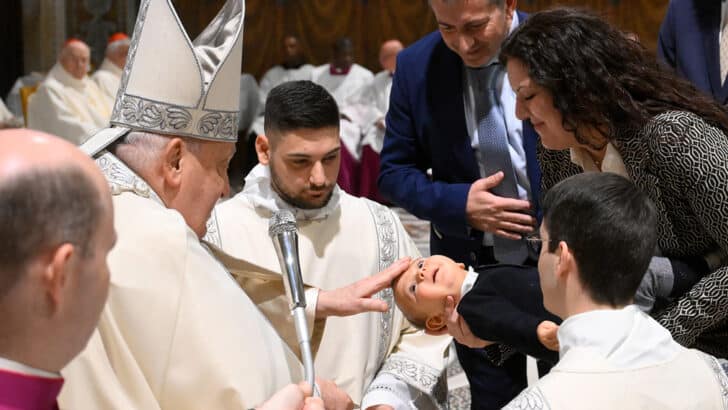“Are you ready to help the parents of this child in their duty as Christian parents?”
“We are”
Recently, I was made the godfather of my girlfriend’s nephew. When her sister and brother-in-law asked us to be godparents, I’ll admit I was both surprised and deeply honoured. The request made me curious though – what exactly are the responsibilities of a godparent? And more importantly, what can I do to help ensure my godson grows into a faithful and virtuous person?
Importance
In a previous article for The Irish Catholic, Cardinal Timothy M Dolan addressed the importance of a timely baptism. He compared it to a child’s first visit to the paediatrician to receive their proper vaccinations to provide protection. Baptism, he argued, is similarly foundational. “What are these benefits? Yes, the cleansing from original sin, but also the recognition of divine adoption, the welcome of the baby into the supernatural family of the Church and the graces of protection and interior strength of the tiny infant. The little one is fragile, helpless, unaware of the mystery and majesty of the Sacrament. That’s fitting, since it’s all pure, unmerited gift. We’re all ‘little ones’ in God’s eyes.”
His words remind us that baptism is not merely a cultural rite of passage or a box to be checked. It is a supernatural gift, a moment when a person – infant or adult – is welcomed into the Church and receives the graces needed for a life of faith.
Though the official requirements to be a godparent are minimal, the call is anything but trivial. Taking this role seriously means accepting lifelong commitment, much like the Christian life itself”
But what does this mean for me, as a godparent? Am I just a witness to the ceremony, a token figure in my godson’s life? The Catechism of the Catholic Church teaches that godparents should be “firm believers, able and ready to help the newly baptised – child or adult – on the road of Christian life.” (CCC 1255) The Code of Canon Law expands on this, stating that “insofar as possible, a person to be baptised is to be given a sponsor who assists an adult in Christian initiation or together with the parents presents an infant for baptism. A sponsor also helps the baptised person to lead a Christian life in keeping with baptism and to fulfil faithfully the obligations inherent in it.” (Can. 872)
Trivial
Though the official requirements to be a godparent are minimal, the call is anything but trivial. Taking this role seriously means accepting lifelong commitment, much like the Christian life itself.
Both of them did not just talk about faith – they lived it. In doing so they gave me an example to follow by being present and intentional”
Throughout this whole process I’ve been thinking about my own godparents and what they mean to me. My godmother, despite being an ocean away, still prays for me and checks in on me. Throughout my life she always made an effort to spend time with me, asking about my faith and my life in general over a slice of pizza. I remember as a teenage being a bit annoyed by this, preferring in those days to have been playing video games than socialising, but now I look back with fondness on her effort to break through my teenage awkwardness.
On the other hand, my confirmation sponsor – who, in many ways, has been a godfather to me – has encouraged me through mentorship, prayer, and conversations. I remember meeting up with him and talking about life over a bowl of ramen. Each time we met he would give me a book to deepen my spiritual understanding. And in those conversations, he would sometimes offer certain challenges or difficult questions for me to think about. Both of them did not just talk about faith – they lived it. In doing so they gave me an example to follow by being present and intentional.
An article on Catholic Answers outlines practical ways to be a good godparent—many of which I’ve seen in my own godparents’ example. In the article they list remembering spiritual milestones (baptism, first Communion, confirmation), encouraging devotion to a patron saint, helping build a spiritual library, and serving as a mentor and prayer companion. Above all, the heart of godparenthood is an intentional relationship grounded in faith.
Ultimately, a godparent is called to safeguard and defend the faith of the newly baptised, which also means continually growing in their own faith. This responsibility is not something we take on by our own strength but through an overflow of God’s love. Maybe this is an answer to the prayers – ‘Lord, increase my faith.’
Mission
In a 2012 homily, Pope Benedict XVI spoke directly to godparents about this mission: “The children who are about to be baptised must walk in this light throughout their lives, helped by the words and example of their parents and their godparents. The latter must strive to nourish with their words and the witness of their lives the torch of the children’s faith so that they may be a shining example in this world of ours, all too often groping in the darkness of doubt, and bring it the light of the Gospel which is life and hope.”
That is the heart of godparenthood: to be a torchbearer of faith, lighting the way for another. And that, I realise, is both a humbling challenge and a beautiful privilege.



